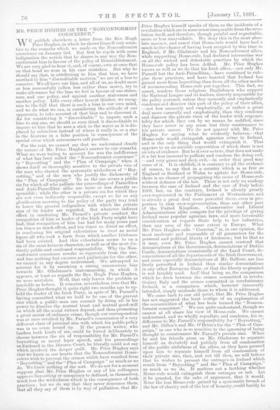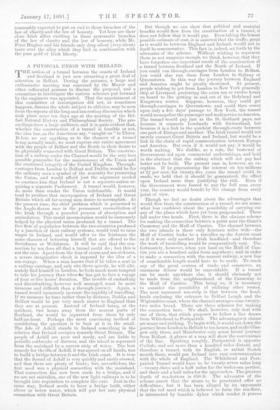• sin for which all who palliate the proceedings of
Parnellites without defiance of the law. There is not only no analogy and Anti-Parnellites alike are more or less directly re- between the case of Ireland and the case of Italy before sponsible ; while the other is a private sin for which they 1866, but, on the contrary, Ireland is already greatly are not even indirectly responsible, except so far as any over-represented in the Parliament at Westminster, and glorification accruing to the policy of the party may tend is already a great deal more powerful there, even in pro- to lower the general indignation with which the private portion to that over-representation, than any other part sins of its leader are regarded. But whatever indirect of the United Kingdom. Conservative and Liberal effect in condoning Mr. Parnell's private conduct the Administrations alike compete for the privilege of giving recognition of him as leader of the Irish Party might have Ireland more popular agrarian laws, and more favourable had, that recognition of him has bad for many years past consideration as regards State help to her industries, ten times as much effect, and ten times as direct an effect, than any area of the same extent in Europe. What in condoning his original exhortation to treat as social Mr. Price Hughes calls " Coercion," is, in our opinion, the lepers all who took a farm from which another Irishman most moderate and reasonable of all guarantees for the had been evicted. And this exhortation seems to us a personal and political liberty of Irishmen ; but be that as sin of the most heinous character, as well as of the most dis- it may, even Mr. Price Hughes cannot contend that tinctly public and confessed responsibility. Why the Non- denunciations of the Government, denunciations of Dublin conformist conscience revolts so vigorously from the one, Castle, denunciations occasionally of the Land Court, de- and has nothing but excuses and palliations for the other, nunciations of all the departments of the Irish Government, we cannot in any degree understand. We attempted to and more especially denunciations of Mr. Balfour, are less account for it by assuming a strong unconscious bias freely permitted in Ireland than similar denunciations towards Mr. Gladstone's statesmanship, in which it in any other European State, or that the liberty so granted appears, at least as regards the Rev. Hugh Price Hughes, is not lavishly used. And that being so, the comparison we were mistaken. Well, that only leaves the problem as which ho drew between the crimes committed in revolu- insoluble as before. It remains, nevertheless, true that Mr. tionary Italy and the crimes committed in revolutionary Price Hughes thought it quite right two months ago to up- Ireland, is a comparison which, however' innocently hold the leader of the Irish Party, in spite of Mr. Parnell's intended, simply misleads those to whom it is addressed. having committed what we hold to be one of the gravest We come back to our old point, that Mr. Price Hughes sins which a public man can commit by doing all in his has not suggested the least vestige of an explanation of power to dissolve the mutual trust and mutual good-will the eccentricities of what has been termed the " Noncon- on which all the social virtues depend, and thus promoting formist conscience." We can quite understand, though we a great access of ordinary crime, though our correspondent cannot at all share his view of Home-rule. We cannot was at once revolted by Mr. Parnell's commission of a very understand, and we wholly repudiate and condemn, his in- different class of personal sins with which his public policy difference to Mr. Parnell's responsibility for " Boycotting," was in no sense bound up. If the present writer, who and Mr. Dillon's and Mr. O'Brien's for the " Plan of Cam- loathes both kinds of sin, could . be forced deliberately to paign," in one who is so sensitive to the ignominy of being choose between the sin of responsibility for Mr. Parnell's thought to countenance Mr. Parnell's private sins. When boycotting or moral leper speech, and his proceedings he and his friends press on Mr. Gladstone to separate as disclosed in the Divorce Court, he literally could not say himself as decisively and publicly from all condonation • which involved the deeper guilt. Mr. Price Hughes says of the public sinfulness of his allies, ae they have pressed that we know in our hearts that the Nonconformist Home- upon him to separate himself from all condonation of rulers wish to prevent the crimes whibh have resulted from their private sins, then, and not till then, we will believe "Boycotting " and the " Plan of Campaign " as much as we that he wishes to prevent the outrages in Ireland which do. We know nothing of the sort. We do not for a moment result from " Boycotting " and the " Plan of Campaign," suppose that Mr. Price Hughes or any of his colleagues as much as we do. It matters not a farthing whether approve boycotting or conspiracy to defraud, in themselves, Home-rule would extinguish these outrages or. not. Let much less the wickedness which is the consequence of both it be granted, for the sake of argument, that it would. practices ; but we do say that they never denounce them, None the less Home-rule gained by a systematic breach of that all they say of them is by way of palliation, that Mr. the law of charity and of the law of honesty, could hardly be Price Hughes himself speaks of them as the incidents of a MR. PRICE HUGHES ON THE " NONCONFORMIST revolution which are in some sense inseparable from the revo- lution itself, and therefore, though painful and regrettable, WE publish elsewhere a letter from the Rev. Hugh more or less unavoidable. We deny this in the most also- Price Hughes, in which he shows himself very sensi- lute manner, and assert that Home-rule would have had a tive to the remarks which we made on the Nonconformist much better chance of having been accepted. by this time in conscience on January 3rd. But first he repels with some England, if Mr. Gladstone and his Nonconformist allies, indignation the notion that he shares in any way the Non- while supporting Home-rule, had declared internecine war conformist bias in favour of the policy.of Disestablishment. on all the wicked and detestable practices by which the We are very glad to hear it, and, of course, own at once that Home-rule policy has been defiled. Mr. Price Hughes on that head we were in his case mistaken. But why he knows as well as we do that his Irish allies,—not only Mr. should say that, in attributing to him that bias, we have Parnell but the Anti-Parnellites,—have combined to eule- ascribed to him " discreditable motives," we are at a loss to gise these practices, and have boasted that Ireland has conceive. We all have our bias, and all of us, no doubt more gained more from boycotting than from all the other modes or less successfully (often less rather than more), try to of recommending Home-rule put together. This fact, we make allowance for the bias we feel in favour of one states- assert, renders those religious Englishmen who support man and one policy, and against another statesman and the National League and its leaders, directly responsible for another policy. Like every other honest thinker, we recog- the policy pursued, unless they earnestly and emphatically vise to the full that there is such a bias in our own mind, condemn and disavow this part of the policy of their allies i and we do what we can, in considering the attitude of our not less earnestly and emphatically, or rather a great opponents, to take account of that bias and to discount it. deal more earnestly and emphatically, than they condemn As for considering it " discreditable" to impute such a and disavow the private vices of the leader with responsi- bias to any one, we should as soon think it discreditable to bility for which they can by no means be saddled, since impute to him that he sees a stick in the water as it is dis- they have never in any sense lent their countenance to placed by refraction instead of where it really is, or a star his private career. We do not quarrel with Mr. Price in the heavens in a false position in consequence of the Hughes for saving what he evidently believes,—that special error which astronomers call parallax. Home-rule would extinguish agrarian crime in Ireland, For the rest, we cannot say that we understand clearly and is the only thing that would extinguish it. That the nature of Mr. Price Hughes's answer to our remarks. appears to us an amiable superstition of which there is not What we were trying to account for was the indifference an iota of evidence. But be it ever so true, that does not make of what has been called the " Nonconformist conscience " it a bit less immoral to palliate and condone the doing evil, to " Boycotting " and the " Plan of Campaign," when it —and. very grave and deep evil,—in order that good may shows itself so thoroughly sensitive to the private vice of come of it. It is childish, it is contrary to all the evidence the man who started the systematic wickedness of " Boy- of reason, to say that in a country which is as free as totting," and of the men who justify the dishonesty of England or Scotland or Wales to agitate for Home-rule, the " Plan of Campaign." To us the one seems a public there is no chance of propagating the cause of Home-rule reasonably expected to put an end to those breaches of the law of charity and the law of honesty. Yet here are their close Irish allies exulting in these systematic breaches of the law of charity and the law of honesty, while Mr. Price Hughes and his friends only drop silent (very silent) tears over the alloy which they find in combination with the pure gold of Irish liberty.







































 Previous page
Previous page